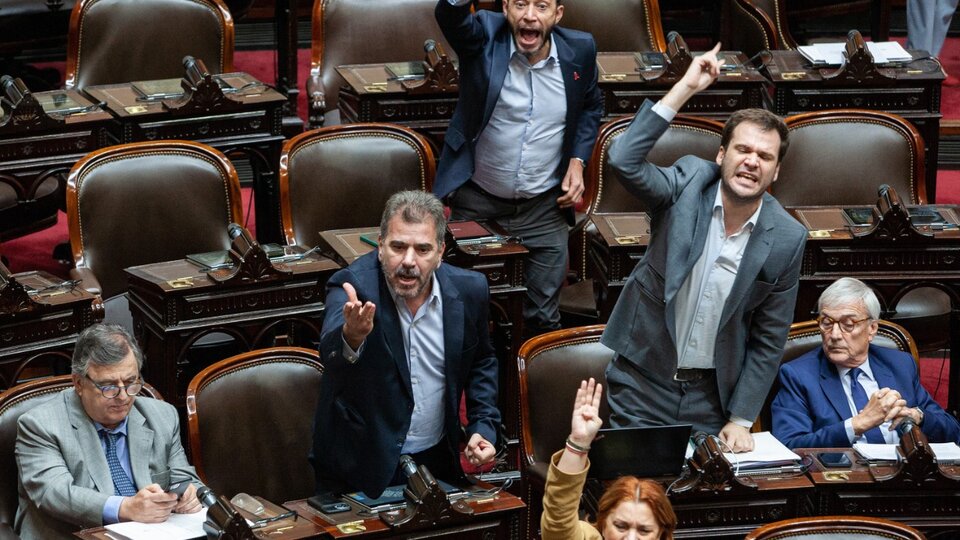
By postponing the sending of the list of legislators to the Council of Magistrates, based on accusations of partiality by the Speaker of the House of Representatives, a joint interlocutory ban on change decided not to provide a quorum for the session attended by officials. To be selected from the body. They openly sought to declare the leadership of the Chamber illegal. ie: preventing organizational activity. This necessitated recourse to Article 37 of the Regulation, which establishes that when new officers are not elected, the existing ones shall continue in their functions.
The composition of the chamber is the same as last year, so it is to approve the existing officers.
Later, a special session was called to discuss the creation of seven national universities. After a quorum was reached, the session began, which was interrupted by the violent behavior of the representatives of the Juntos por el Campio.
Some of its members shouted, insulted and beat the benches with all their might, creating an atmosphere of open organizational crisis. Grievances and misogynistic shouts directed at chamber president Cecilia Moreau prompted a delegation of the Frente de Todos bench to approach it with a defensive attitude.
Television cameras broadcast this anti-democratic shock live. From within an institution of democracy we could see how the main opposition gave clear indications of its anti-democratic practices. They made a clear attack on the legitimacy of the institutions. One of its aims for change seems to be to put the democratic system in crisis, which is expressed, among others, in the brutalities and explosions that took place in that place this Thursday.
There are national and international precedents for these violent outbursts.
In various protest marches in Argentina we have seen guillotines, gallows, morgue bags, paintings of the executed and coffins with the names of the enemies. It is a political culture that associates political action with death. In this conception, the other is not the one with whom one is conversing and debating: he is the one one seeks to eliminate.
At one of those marches, in front of the Patria Institute, death threats were made against the nation’s vice president, who was reprimanded from a megaphone: “We are going to hang you here, in front of the Patria Institute, or else, in front of the Senate.” The same demonstrators added: “This time we are going to search them with machine guns to disperse and execute them.” This was not the only time: similar death threats against the vice president were repeated at other rallies.
These are not isolated incidents. After the fall of totalitarian terror in 1983, trying to disrupt the consensual democratic culture was a violent practice in full swing. These anti-democratic practices do not threaten democracy from without: they do so from within. Sectors where its protagonists gain access to institutions through free elections but, once in them, contribute to fueling a political culture dominated by high levels of violence, brutality and impunity. They operate in democracy but try to outlaw it.
Direct violence, physical and verbal, coexists with institutionalized violence. This is what the Vice President noted during closing arguments before the highway court: “It’s more of a firing squad than a court.” “As I said on December 2, 2019, at the beginning of this trial, the sentence was written. I never thought it would be written so badly,” he said, adding that the allegation was a series of lies and even non-existent facts.
Something similar emerged in Claire’s newspaper opinion piece after the assassination attempt: “Christina, between the missed bullet and the missed verdict,” in which the bullet and the verdict were equated. , looking forward — without meaning — is the metaphor used by the Vice President when he relates the firing squad to the court that judges him.
These violent shocks also have various international precedents.
On January 6, 2021, supporters of Donald Trump took over the two-chamber Capitol of the US Congress, violently disrupting a joint session of the legislative branch seeking to confirm Joe Biden’s victory for several hours. Elections. 2020 Presidential Elections. Images of protesters wearing buffalo hides and large horns or sporting racist symbols traveled around the world.
In November, after Lula won Brazil’s election, pro-Bolsonaro protesters blocked a road near São Miguel do Oste in Santa Catarina and staged a Nazi salute in front of a military platoon. They did not accept Lula’s victory and called for military intervention.
Where laws are framed, the displays of barbarism, brutality and obscenity by representatives of the Constituent Assembly for Change in the National Parliament are part of a long line of anti-democratic incidents created by the worst right wing. Nationally and globally in recent times the extreme right.
Forty years after the return to democracy, we are deeply concerned about these acts of violence that could mean an attempt to return to authoritarian regimes. Why return to autocracy? Other older efforts include a return to a private pension system, reforming labor laws, and promoting policies such as privatization of public enterprises.
Parliament must soon approve a tax data exchange agreement with the United States that would allow access to information about Argentina’s undeclared funds and assets in that country. If this comes into effect, according to the calculations revealed, a taxable base of at least US$100,000 million will be created. At the same time, are the opposition parties trying to weaken and discredit the parliamentary system?
* National Vice President of the Frente de Todos and President of the Solidarity Party

“Introvert. Thinker. Problem solver. Evil beer specialist. Prone to fits of apathy. Social media expert. Award-winning food fanatic.”





More Stories
Two influencers drown after refusing to wear life jackets: “ruining selfies”
Uruguay 2024 election results: who won and when is the second round | Waiting to know whether there will be a runoff or not
Uruguay: Lacalle Pou leaves with his figure on the slopes | The Marcet and Asteziano scandals hit the right-wing ruler